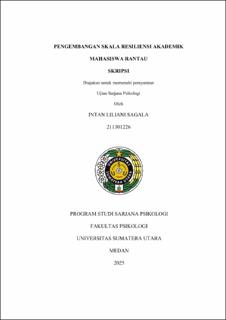Pengembangan Skala Resiliensi Akademik Mahasiswa Rantau
Development of an Academic Resilience Scale for Migrant University
Abstract
Migrant university students are a population that faces dual pressures, including academic demands and the challenges of social and emotional adaptation due to being away from their original environment. Therefore, a measurement instrument is needed that can specifically capture the dynamics of academic resilience within this population. The scale development process followed a systematic procedure based on DeVellis (2017), which includes: theoretical construct definition, item construction, content validation by experts using Aiken’s V coefficient, pilot testing, exploratory factor analysis (EFA), confirmatory factor analysis (CFA), and estimation of internal reliability. The sample consisted of 198 active migrant students from various universities in Indonesia, selected using a convenience sampling technique. EFA yielded six key dimensions: academic persistence, emotional regulation and homesickness, new social support, meaning and internal motivation, personal adjustment, and spirituality. The CFA results showed that the measurement model approached acceptable fit criteria, with RMSEA = 0.085 and CFI = 0.834. Reliability estimation using Cronbach’s Alpha and McDonald’s Omega showed very high internal consistency (α = 0.958), indicating that the scale is highly reliable. The findings demonstrate that the developed academic resilience scale for migrant students possesses adequate content validity, construct validity, and internal reliability, making it suitable as a psychological measurement tool for assessment and intervention within the context of higher education in Indonesia.
Collections
- Undergraduate Theses [1451]

